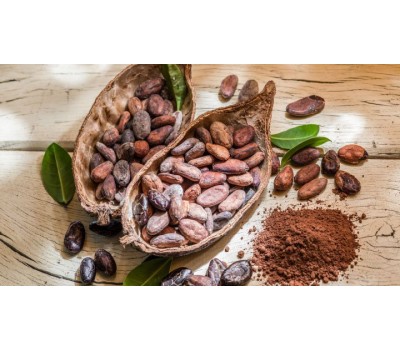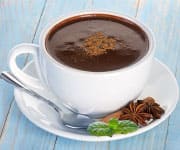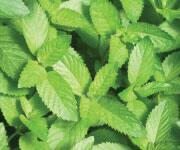A Natural Alternative to Coffee

Each morning, about 64% of adult Americans consume at least one cup of coffee.1
The brain responds by releasing noradrenaline that provides a quick energy boost. This is often followed by a “caffeine letdown” whereby noradrenaline in the brain is depleted and subsequent coffee fails to provide sufficient mental boost.
According to a recent poll, 26% of Americans say they are addicted to coffee.1 Some wish they could quit for a few weeks to regain the energy-boost that coffee previously provided.
For many people, brain fog develops in mid-to-late afternoon. Others find it difficult to focus clearly upon awakening.
A healthy alternative to coffee has been shown to quickly reverse mental deficits. Those who experience brain fatigue in the morning or later in the day now have a pick-me-up alternative that also improves brain focus and clarity.
Natural compounds have been clinically demonstrated to improve attention and concentration by preserving brain neurotransmitters (such as noradrenaline).
A proprietary spearmint extract combined in cocoa powder can now be mixed into a convenient beverage. It can be used for precisely those times when we need a boost to mental sharpness, focus, and attention.
In addition, cocoa powder promotes micro-vascular blood flow in the brain, assuring moment-by-moment oxygenation to brain regions needed for focus and working memory.
Coffee Has Beneficial Effects
 |
Coffee beans contain polyphenols such as chlorogenic acid that have demonstrated health benefits.
For some people, even decaf creates discomforts like heartburn and excess nerve stimulation.
For those who don’t want to reach for a cup of coffee, the combination of cocoa and spearmint is a great alternative for erasing brain fog and achieving mental clarity.
Cognitive Benefits of Spearmint

Spearmint leaves have long been used in cuisine and to produce a soothing, refreshing scent associated with relaxation.2,3 Studies now show that spearmint can “wake up” the brain and boost cognitive function.
Two recent scientific studies reveal the powers of a group of phenolic compounds found in a proprietary extract of spearmint.4,5 Results showed that the spearmint improved attention, concentration, and brain function.
The first study was an open-label (no control group) pilot study among 11 healthy adults, average age 59.4 All subjects had self-reported memory impairment at baseline.
Subjects received 900 mg of a spearmint extract once daily with breakfast for 30 days.
Subjects underwent an acute evaluation to determine the immediate effects of the supplement. The computerized cognition tests began one hour before the first dose, and again at 2.25 and 4 hours after the dose. This battery of cognitive tests measured memory, reasoning, attention/concentration, and planning.
On two acute tests of attention and concentration measuring working memory, subjects demonstrated significant improvements over baseline at 2.25 hours, and again at four hours, following a single dose of the spearmint extract.
By 4 hours, a 46% improvement was demonstrated on one task, with a 121% improvement on the other.
In this same study group using a test evaluating planning abilities, subjects showed a 39% improvement over baseline at four hours.
Long-term tests, conducted after 30 days of daily supplementation, also showed significant overall improvements.
On a test of reasoning, subjects showed a 35% improvement over baseline scores, and on a second test measuring attention and concentration, they showed an impressive 125% improvement.
The researchers also measured a 48% increase in planning ability that was reported as a “trend” toward improvement.4
What You Need to Know
 |
Spearmint and Cocoa for Brain Performance
- That afternoon low point in mental sharpness, focus, and attention is something most of us have learned to live with.
- Some reach for another cup of coffee, but at this time of day that extra cup could cost them valuable sleep.
- Human studies have demonstrated that a group of phenolic compounds from spearmint can enhance performance on tests of working memory, the critical factor in sustaining attention and focus during problem solving.
- Cocoa powder was recently shown to significantly improve the match between brain cell activity and brain blood flow, an important requirement for crisp mental function that also correlates with resistance to developing dementia.
- Spearmint extracts have now been added to a high-quality cocoa powder to provide a boost for attention and mental focus, capitalizing on the benefits of each natural compound.
- There is no longer any reason to tolerate morning grogginess or the “four o’clock fade.” A cup of spearmint hot chocolate may be just the right prescription for sustained brain performance throughout the day.
Controlled Clinical Trial of Spearmint Extract
A larger, randomized, double-blind, placebo-controlled study followed after the first was published, which further demonstrated the brain benefits of this spearmint extract.
In this study, 90 subjects, average age 59—with known age-associated memory impairment but not dementia—were enrolled.5
One of the study’s target outcomes was the effect of the extract on subjects’ working memory. This is important because good “working memory” enables multiple memories/sensory inputs to be integrated to direct decisions and reactions.
Subjects received the spearmint extract daily with breakfast for 90 days at one of two doses, 900 mg or 600 mg, or placebo. The extract was standardized to contain 14.5% rosmarinic acid, one of spearmint’s important components.
At day zero, and on days 45 and 90, subjects underwent a battery of computerized tests of cognitive performance.
The study results found that, by day 90, subjects taking the 900-mg supplement dose had a significant 3-time improvement in the quality of their working memory compared with placebo recipients. This indicates alert brain function.
The lower-dose (600 mg) group showed a non-significant improvement over baseline.
Another cognitive test measured spatial working memory (the ability to know where items are arranged in space, and how to use this information). People on the 900 mg/day supplement dose demonstrated a nearly-3-times improvement compared to the placebo.
Of additional interest, the higher-dose (900 mg) group also showed significant improvements in their sleep patterns, with increased ease in getting to sleep, and better alertness and behavior following awakening.
Together these clinical trials provide compelling support for this novel spearmint extract on helping individuals stay focused and on-task by boosting working memory capacity—under both acute and chronic circumstances.
What is Working Memory?
 |
Many studies of cognition report on something called working memory. We can think of working memory as akin to our desktops (real or on a computer). It is the “space” where we hold various bits of information while we compare them with each other, eventually developing a plan for how to respond to a given situation. All of this takes place in the blink of an eye, and we are not ever conscious of the complex interactions going on deep in our brains.
For example, a driver approaching a red light puts “red light” in working memory, and then pulls out “filed” information about what a red light means. That in turn triggers further associations, so that the driver adds “car approaching from the right,” the current speedometer indication, road conditions, and myriad other facts, and then integrates them in an orderly way, resulting in an apparently automatic response to press the brake pedal, continue scanning for traffic, a glance in the rearview mirror, and all the other mental and motor tasks required to bring the car to a safe stop ahead of the intersection.
Loss of working memory, then, impairs our ability to operate safely and efficiently in an ever-changing world, and contributes to the confusion, momentary disorientation, and uncertainty that plague so many of us as we age.
Improvements in working memory are therefore measureable gains in an individual’s ability, not only to cope, but to thrive as an independent-living adult.
Cocoa Improves Brain Focus and Blood Flow
Cocoa (without sugar) is a beverage with a reputation for producing comfort and relaxation.
A recent clinical study has demonstrated the benefits of cocoa powder on brain focus in humans. In addition, scientists evaluated a microvascular phenomenon called neurovascular coupling. This beneficial effect occurs when tiny blood vessels dilate (open-up) to deliver more blood to brain regions where increased cellular activity is required.6
Sixty adults, average age 73, participated in a double-blind, randomized clinical trial. All subjects were hypertensive or had well-controlled type II diabetes.
Subjects were randomly assigned to receive a cocoa beverage that was either rich in flavonols or deficient in flavonols, consuming two cups of the assigned drink daily for 30 days.
All subjects had measurements of their neurovascular coupling and cognitive function at baseline and on days one and 30 after beginning the cocoa consumption.
What this study demonstrated was that, at 24 hours, subjects with impaired baseline neurovascular coupling had a 10.6% improvement in neurovascular coupling, and, by 30 days, these subjects’ performance on a test requiring attention significantly improved.6
The baseline time to complete this test was 167 seconds (more than 2.75 minutes), while after 30 days of supplementation that time was just 116 seconds (less than two minutes), a 51-second gain. Clearly, the cocoa beverage was speeding up brain function and alertness.
This study’s important contribution is that it showed how cocoa supplementation can boost brain blood flow in response to need (defined as neurovascular coupling), that directly affects our ability to focus and pay attention, even over the short term.
The study also found, somewhat surprisingly, that the flavonol-rich and the flavonol-poor cocoa drinks produced the same effects, showing that something other than flavonols was responsible for the observed improvements.6
Another study enrolled 20 young adults (average age 33) who were randomly assigned to receive 11.6 grams of cocoa powder, a mix of caffeine and theobromine (components of cocoa), or a placebo.7
This study focused on the immediate, short-term cognitive effects of cocoa consumption, with cognitive function tests administered before treatment, and one and two hours after treatment.
The study showed that, compared to placebo, cocoa powder significantly shortened reaction time and boosted alertness in a test that required focus, attention, and concentration.7
Essentially, the results suggest that the small amount of naturally occurring caffeine + bioactives of cocoa called theobromine are responsible for cocoa powder’s impact on alertness and mood.
The study tested various aspects of enhanced brain functioning such as reaction time, rapid visual information processing and energetic arousal and found that all were improved with the ingestion of the cocoa powder and its components.
Together, these studies show that cocoa produces near-immediate improvements in the cognitive functions when we need to pay attention, to focus, and to concentrate. These are all measures of improved working memory.
Unique Properties of Spearmint Extract K110-42
 |
Modern science has unraveled many of the secrets of spearmint, which is rich in phenolic compounds, like rosmarinic acid.
Research reveals that such phenolic compounds inhibit an enzyme, acetylcholinesterase, that breaks down the vital memory-associated neurotransmitter acetylcholine.8-10
As a result, greater amounts of the neurotransmitter are available to brain cells in memory-intensive portions of the brain.
Spearmint phenolic compounds are also potent oxidative stress-preventives, helping to protect brain cells from direct oxidative damage.11,12
A proprietary mix of spearmint phenolic compounds, sourced from patent-pending, non-GMO lines of spearmint, known as K110-42, has now been grown for the express purpose of use in a cognition-enhancing supplement.14,15
These spearmint lines have a distinct phytochemical composition that is significantly richer in rosmarinic acid and other phenolic compounds, compared with standard commercial spearmint.14,16
The phenolic mix is extracted using a water extraction method and a patent-pending drying technique aimed at optimizing the phenolic content.
This concentrates the important rosmarinic acid component more fully than does steam extraction.
Spearmint and Cocoa Effects on Brain
While many details are still under investigation, it is clear that natural compounds found in spearmint extract and in cocoa powder exert potent activity, not only on brain cells, but also on the vascular structures that support and nourish them.
Phenolics present in spearmint inhibit the acetylcholinesterase enzyme, resulting in higher concentrations of the neurotransmitter acetylcholine, which is critical for memory and cognitive function.8-10
In a mouse study, a spearmint phenolic, rosmarinic acid, was shown to provide continued neuroprotection for key memory centers of the brain (e.g., hippocampus and cortex), against the cellular damage caused by oxidative stress.11
Even more exciting, rosmarinic acid and the other phenolics present in spearmint induce the expression of essential growth factors that promote formation of new brain cells.12
In particular, rosmarinic acid was shown to significantly enhance new cell growth in cultures of cells from the working memory center of the brain, the hippocampus.12
Cocoa also contains polyphenols that have been shown to improve performance on tests of cognition in animal models.13
Cocoa has the ability to improve neurovascular coupling, the matching of blood flow to the areas of the brain being called on to perform cognitive tasks.6
Why is Neurovascular Coupling Important in the Brain?
 |
Cocoa is rich in numerous phenolic and other bioactive compounds, and has recently been found to have a specific beneficial effect on neurovascular coupling,6 a measure of how well blood flow matches brain cell activity in tiny regions of the brain.17-19
Strong neurovascular coupling suggests that blood flow is well matched to those brain areas that need fresh oxygen and nutrients.
It is now known that those with impaired neurovascular coupling are more likely to have cognitive decline, and, furthermore, that deterioration of neurovascular coupling precedes measureable impairment in cognitive function during brain aging.20,21
So, any therapy that can restore normal neurovascular coupling may indeed help to slow the onset or progression of these dreaded conditions.
Summary
Recent human studies make a compelling case for taking a powdered drink mix of spearmint extract and cocoa powder.
The combination seems ideal for use as an immediate pick-me-up beverage for those times when we could use better focus, attention, and concentration.
These plant-sourced ingredients have demonstrated brain-activating effects that provide cognitive benefits throughout the day.
For those who seek an alternative to coffee, or want to cut back their caffeine consumption, enjoying a cup of hot spearmint-cocoa may provide clearer thinking, better focus, and greater mental clarity.
By John Ramirez
Article extracted from Life Extension Magazine


Social Login